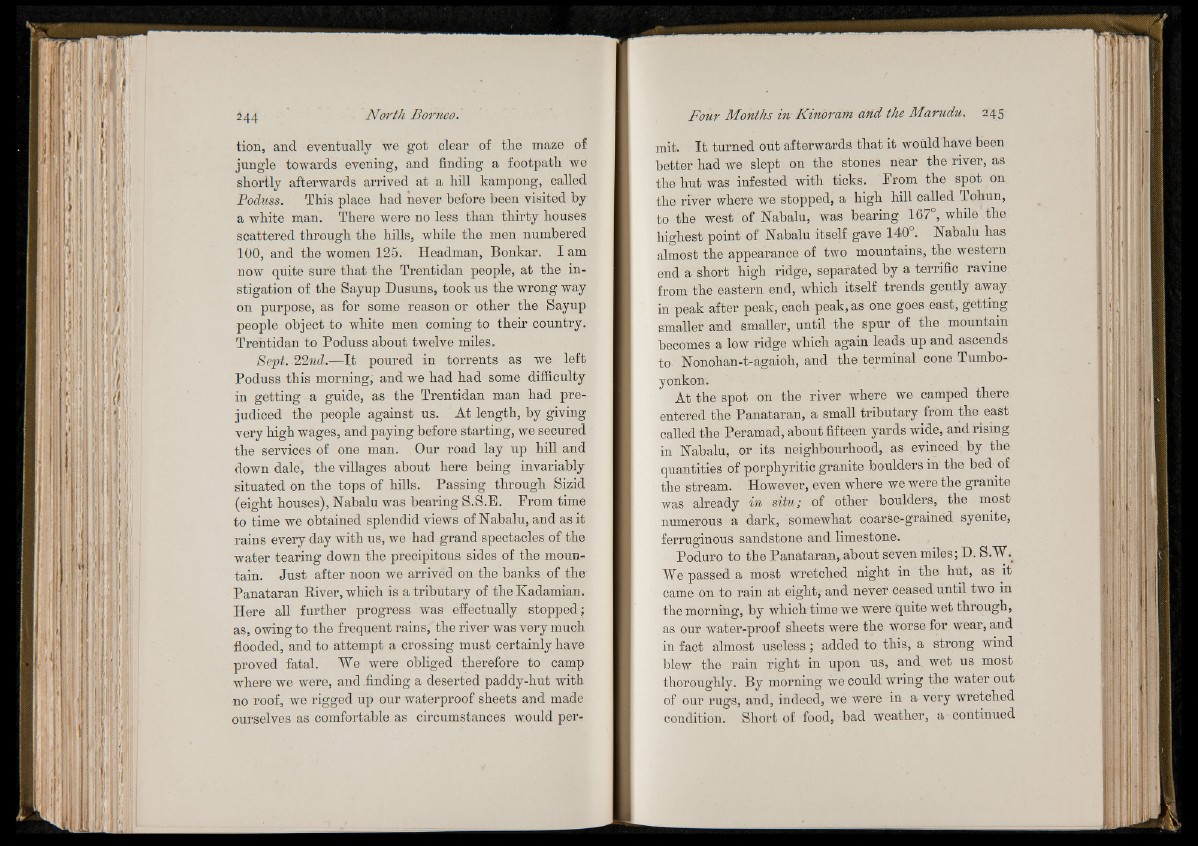
tion, and eventually we got clear of the maze of
jungle towards evening, and finding a footpath we
shortly afterwards arrived at a hill kampong, called
Poduss. This place had never before been visited by
a white man. There were no less than thirty houses
scattered through the hills, while the men numbered
100, and the women 125. Headman, Bonkar. I am
now quite sure that the Trentidan people, at th e . instigation
of the Sayup Dusuns, took us the wrong way
on purpose, as for some reason or other the Sayup
people object to white men coming to their country.
Trentidan to Poduss about twelve miles.
Sept. 22nd.—I t poured in torrents as we left
Poduss this morning, and we had had some difficulty
in getting a guide, as the Trentidan man had prejudiced
the people against us. At length, by giving
very high wages, and paying before starting, we secured
the services of one man. Our road lay up hill and
down dale, the villages about here being invariably
situated on the tops of hills. Passing through Sizid
(eight houses), Nabalu was bearing S.S.E. Prom time
to time we obtained splendid views of Nabalu, and as it
rains every day with us, we had grand spectacles of the
water tearing down the precipitous sides of the mountain.
Just after noon we arrived on the banks of the
Panataran Eiver, which is a tributary of the Kadamian.
Here all further progress was effectually stopped;
as, owing to the frequent rains, the river was very much
flooded, and to attempt a crossing must certainly have
proved fatal. We were obliged therefore to camp
where we were, and finding a deserted paddy-hut with
no roof, we rigged up our waterproof sheets and made
ourselves as comfortable as circumstances would permit.
I t turned out afterwards that it would have been
better had we slept on the stones near the river, as
the hut was infested with ticks. From the spot on
the river where we stopped, a high hill called Tohun,
to the west of Nabalu, was bearing 167°, while the
highest point of Nabalu itself gave 140 . Nabalu has
almost the appearance of two mountains, the western
end a short high ridge, separated by a terrific ravine
from the eastern end, which itself trends gently away,
in peak after peak, each peak, as one goes east, getting
smaller and smaller, until the spur of the mountain
becomes a low ridge which again leads up and ascends
to Nonohan-t-agaioh, and the terminal cone Tumbo-
yonkon.
At the spot on the river where we camped there
entered the Panataran, a small tributary from the east
called the Peramad, about fifteen yards wide, and rising
in Nabalu, or its neighbourhood, as evinced by the;
quantities of porphyritic granite boulders in the bed of
the stream. However, even where we were the granite
was already in situ; of other boulders, the most
numerous a dark, somewhat coarse-grained syenite,
ferruginous sandstone and limestone.
Poduro to the Panataran,.about seven miles; D. S.W.
We passed a most wretched night in the. hut, as it
came on to rain at eight, and never ceased until two in
the morning, by which time we were quite wet through,
as our waterr-proof sheets were the worse for wear, and
in fact almost useless; added to this, a strong wind
blew the rain right in upon us, and wet us most
thoroughly. By morning we could wring the water out
of our rugs, and, indeed, we were in a very wretched
condition. Short of food, bad weather, a continued